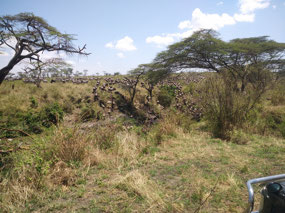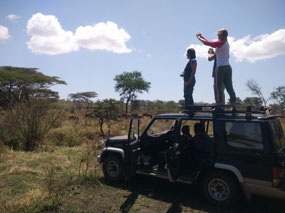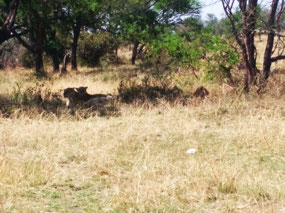After a bitter cold night we set out for the migration. Our best chance is to follow a piece north over a barely used road. And soon we are rewarded with a wildebeest crossing the road.
We look where they come from and see a large group approaching. There must be hundreds. We move the car behind some bushes, but the animals notice us. They are edgy. The leaders stop and the column comes to a halt. But after fifteen minutes more and more animals push up from the rear, until hundreds are slowly pushing each other forward.
Once the first ones start to cross our path, the rest starts to follow. And soon we watch hundreds and hundreds of wildebeest slowly but inexorably push their way through the bushes and open veldt to an invisible destination.
One thing that strikes me is the lack of noise. Our car windows are open, but except for the occasional bellow of an animal, the thousands of hooves on the grass or bare soil makes no sound. As in a dream they pass, until the line becomes thinner and finally the stragglers arrive.
When we start the car, you can see the herd instinct: the stragglers don't want to be cut off from the herd and start to run. So as we pull up, a whole group comes running to quickly pass in front of the car.
We continue the path, until we see some buildings and find ourselves in Migration Lodge. A worker points us to the river, and even follows us by car to make sure we take the right exit. It all looks like forested savanna here, and the roads are just wheel tracks in the grass.
Very carefully over large rocks and gullies we crawl downhill over a winding path. The sun is hot, and insects - some stinging flies - swarm around the car.
Because of the trees and bushes we cannot see very far, but suddenly Mariles calls out 'Lions!'
Under a tree in the shade are four or five female lions stretched out in the yellow grass. They must have eaten and hardly move as our car slowly drives by at less than ten meters (30 feet).
Then the path descends steeply and our car hobbles over stones, while bushes scratch the bottom and sides, until we see the river.
It's rather small, but it has cut a rather deep bed into the ground.
As our path follows its bends, we notice lots of wildebeest higher up our slope.
We try to guess where they will cross, and see signs of earlier crossing. While moving higher up, we see long lines of wildebeest along the ridge of the mountains. The higher we come, the more animals we see. An approaching army.
At some place they seem to be moving down to the river. We quickly turn around, and reach a spot where the first rows are crossing. We park the car and climb on top (I am sure it's illegal), and we look straight down into the river bed, and watch in amazement as thousands of animals race accross. It seems the line of approaching animals does not stop. After an hour they still come running to the river, and clumbering up the other steep bank.
We all enjoy it so much: we are in the middle of the wilderness, not a person around for miles, the migrating animals are racing by not even ten meters away.
It takes us an hour and a half to slowly work our way back to the local road, and all that time we keep talking about the amazing spectacle we have seen.
Back at Lobo, we decide to leave directly for Seronera, so we can regain the day lost because of the battery problem.
After several hours of shaking in the car, but this time with a strong roof rack, we reach our familiar campsite.
The first time we arrived here, it was night, and it seemed the end of the world. Now it seems home.
Under millions of stars and two strands of the silver milky way, we close the zippers of our tents.

 Lobo Wildlife Lodge, Mara Region, Tanzania
Lobo Wildlife Lodge, Mara Region, Tanzania







batchie
2018-08-14
very nice view. so natural. great adventure.
batchie
2018-08-14
enjoy amigong rob and sisi. (hans and mariles, henry and his partner)
Ruud
2018-08-14
Nice trip, good story